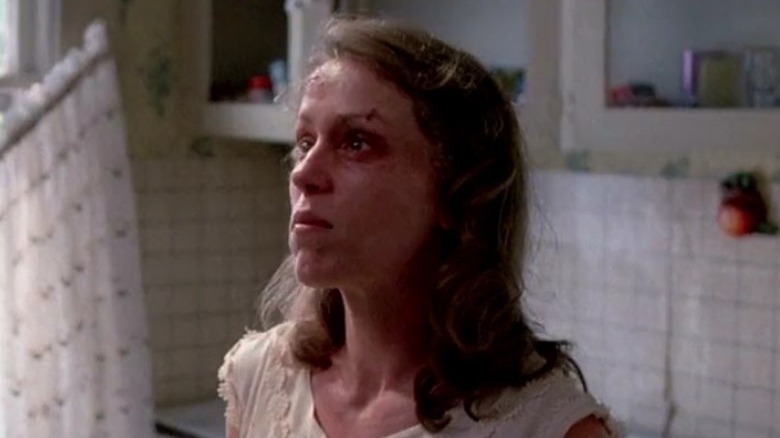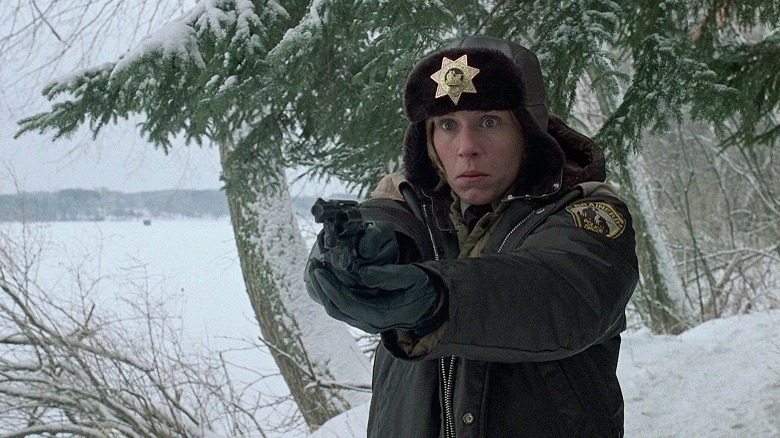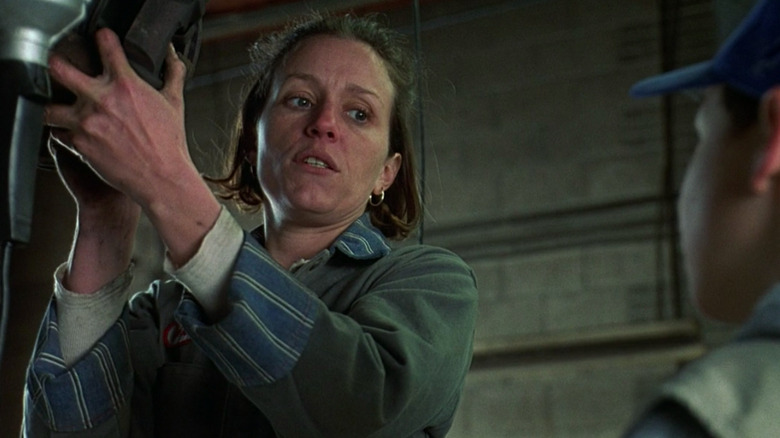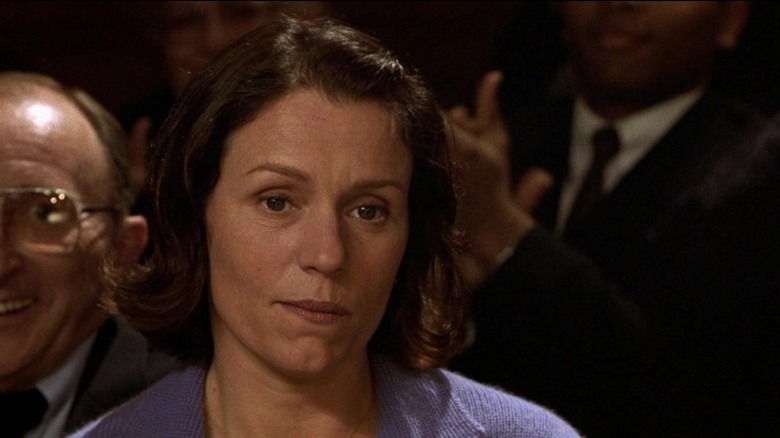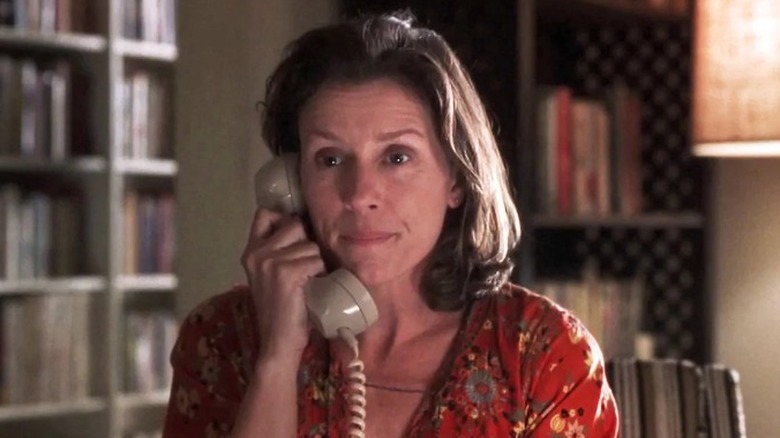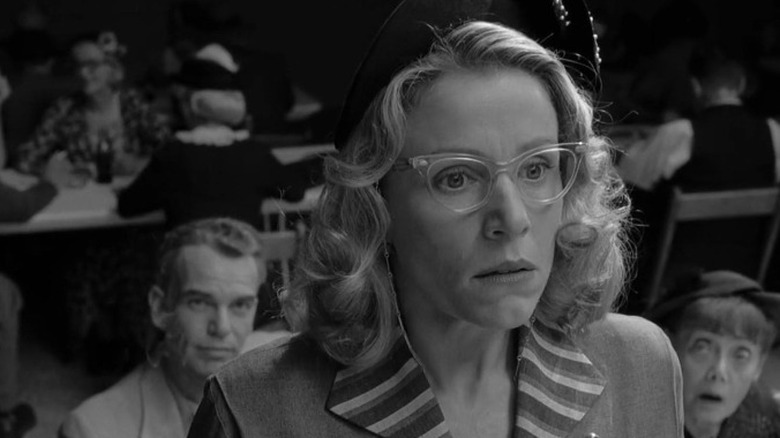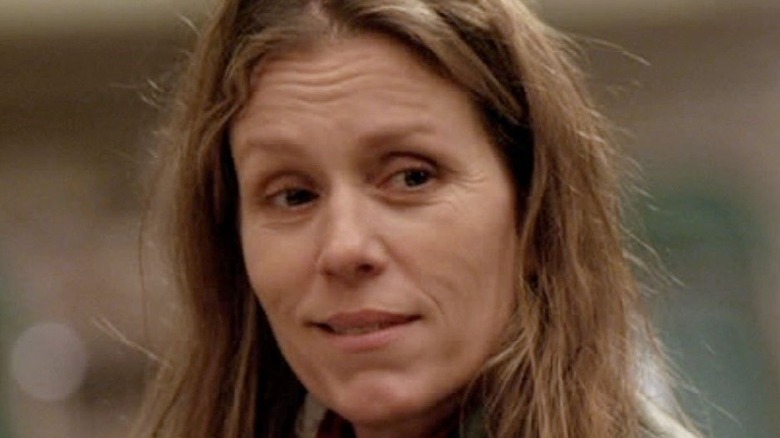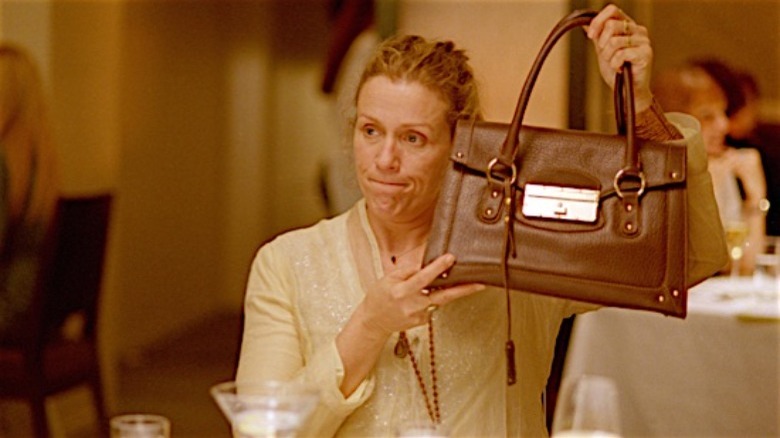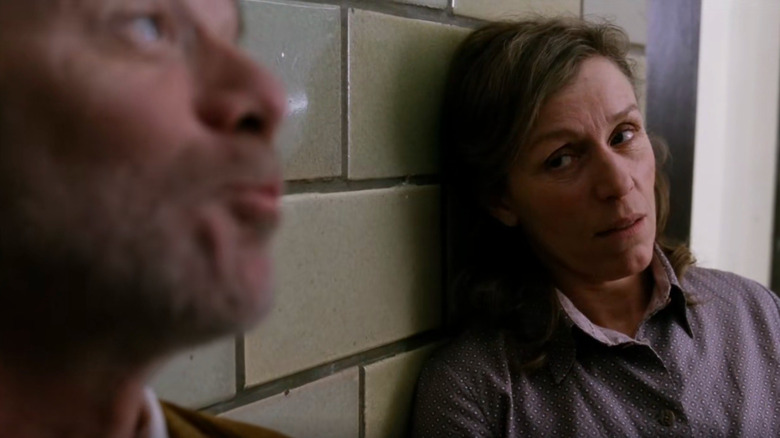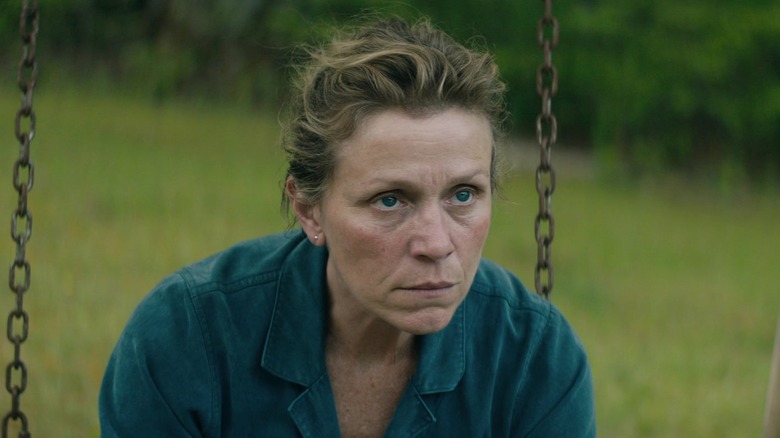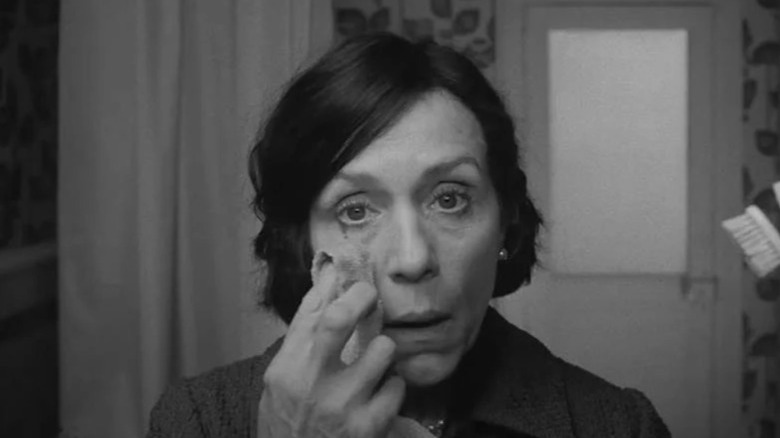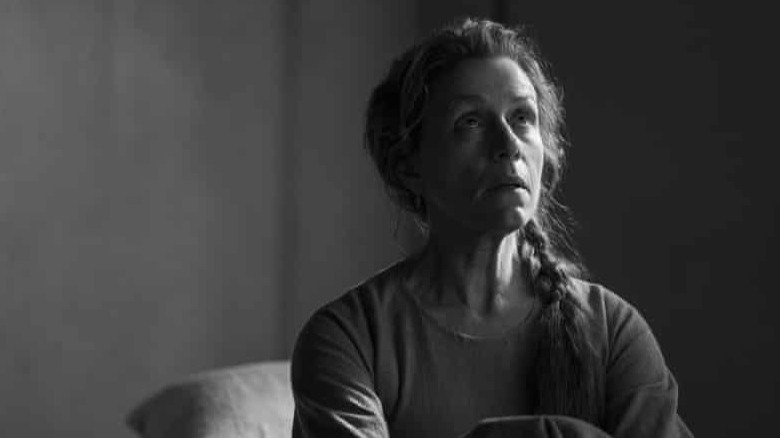Frances McDormand's Best Movie And TV Performances
While some actors might leave us stretching to find a dozen or more amazing performances, when it comes to Frances McDormand, there is no such struggle. The acclaimed and outspoken McDormand has had such an illustrative career that, if anything, it is difficult to single out only 14 of her top roles. After all, she is a triple Oscar-winning, double Emmy-winning, Tony award-winning performer with a penchant for choosing complex and unique roles.
McDormand has 68 onscreen credits as of this writing, per her IMDb, beginning with the 1984 film "Blood Simple," which was written, directed, and produced by her future husband and frequent collaborator Joel Coen and his brother and partner Ethan Coen. Over the nearly four decades since, McDormand has climbed to the top of the Hollywood food chain — something the actress has done purely on her talent, as she often refuses to play by Tinseltown's rules for style, aging, awards campaigning, or simply mincing words.
McDormand can also be seen in 2021's "The Tragedy of Macbeth." After that, she will appear in Sarah Polley's "Women Talking." With the former included, we have compiled a list of some of the key points in an incredibly distinguished Hollywood career. Here are some of McDormand's best movie and TV performances.
Mississippi Burning
After her on-screen debut in "Blood Simple," Frances McDormand began working solidly, both in television (for instance, the short-lived show "Leg Work" and a six-episode guest arc on "Hill Street Blues") and in film. She appeared in a number of Coen Brothers' films, including "Crimewave," which they wrote, and "Raising Arizona," which Joel directed, Ethan produced, and the brothers co-wrote. While these were solid projects, it was the 1988 film "Mississippi Burning" that took McDormand's career to new heights. She was nominated for an Academy Award for Best Supporting Actress for her role in the film, and she won honors from the National Board of Review, Chicago Film Critics Association, and Kansas City Film Critics Circle.
"Mississippi Burning" is a historical crime drama focused upon an investigation into the disappearance of a multiple civil rights activists in 1960s Mississippi. FBI agents Alan Ward (Willem Dafoe) and Rupert Anderson (Gene Hackman) are met with distrust and a lack of cooperation from locals, including the police, who themselves are linked to the Ku Klux Klan. McDormand played Mrs. Pell, the wife of the local deputy sheriff, who helps the FBI by telling them the missing men had been murdered (and who suffered the consequences at home from her abusive husband). "I hope attention is paid to McDormand," wrote legendary critic Roger Ebert in his Chicago Sun-Times review. Variety's reviewer called the performance "glowing," while The Washington Post said "McDormand gives one of the year's most complex performances as the submissive, troubled wife."
Fargo
Frances McDormand continued to do great work after "Mississippi Burning," including in the acclaimed film "Short Cuts," which featured an ensemble of 22 principal characters across nine short stories. But her next truly noteworthy performance was in 1996's "Fargo," which remains one of McDormand's best known roles to date. Another Coen brothers project, "Fargo" is a black comedy about a kidnapping scheme gone awry, and the pregnant, heavily accented North Dakota cop who is on the kidnapping-turned-murder case. McDormand appears as said cop, Brainerd police chief Marge Gunderson. "McDormand is excellent and has a lot of fun with her tenacious and competent character," wrote The Hollywood Reporter in their review.
McDormand won the Best Actress Oscar for her turn as Marge, as well as a Screen Actors Guild Award, Golden Satellite Award, Independent Spirit Award, and many other critics notices. She was also nominated at the British Academy of Film and Television Awards and at the Golden Globes — her first individual Globe nomination (she had previously been nominated as part of the "Short Cuts" ensemble). It may have been premature when The Washington Post's reviewer declared that "Frances McDormand enjoys the comedic role of her career," but is it still true decades later? As Marge would say, "you betcha, yeah."
Hidden in America
Frances McDormand racked up five onscreen credits in 1996, including "Fargo" and the television film "Hidden in America," which aired on Showtime in 1996 and which serves as our next entry on the list. The movie is about the American working-class, and one family's struggle to find the support they need for their sick child, as complicated by the father's pride and naivety. Beau Bridges played the father, Bill Januson, and a young Jena Malone appeared as his sick daughter Willa, whose health suffers from her severe malnutrition. Bill's other child, Robbie (Shelton Dane) is a wise-beyond-his-years preteen who strikes up an unlikely friendship with a local mechanic, Gus (McDormand). Together, Gus and Robbie work to fix up a car to sell it for profit.
"McDormand's tough Gus is a gem," wrote Variety in their short review of the TV film. Unsurprisingly, McDormand was nominated for her an Emmy award for the role, in the category of Outstanding Supporting Actress in a Limited Series or Television Movie. This would be her first career Emmy nomination, but not her last.
Wonder Boys
Frances McDormand's first great film of 2000 was Curtis Hanson's "Wonder Boys," which was very much a Michael Douglas vehicle — but a Michael Douglas vehicle that was snatched in many instances by McDormand's scene-stealing abilities. In the film, Douglas's character Grady Tripp is a creative writing professor who is struggling with replicating his success and reeling from the breakup of his third marriage. McDormand plays the university's chancellor, Sara Gaskell, who is married to Grady's department chair and with whom Brady is having an affair. As Grady involves himself in the life of a darkly mysterious student, James (Tobey Maguire), he eventually finds himself torn when James steals a piece of memorabilia from a party at pregnant (with Grady's baby) Sara's home.
For her work in "Wonder Boys," McDormand was rewarded with a number of critic awards, including from the Florida Film Critics Circle, the Los Angeles Film Critics Association, and the Boston Society of Film Critics. Variety wrote that, "McDormand excels in a quiet, understated perf that differs from earlier efforts," while Rolling Stone called the performance "head-of-the-class."
Almost Famous
Right after "Wonder Boys," and also in 2000, Frances McDormand appeared in Cameron Crowe's highly acclaimed dramedy "Almost Famous." The film featured Patrick Fugit as William, a bright young teenager who, after being given a freelance writing assignment, attends a Black Sabbath concert wherein he meets groupie "band-aid" Penny Lane (Kate Hudson). He then heads out on tour with the band Stillwater, alongside Penny and the other band-aids, so that he can write a piece for Rolling Stone. McDormand played William's overprotective mother Elaine Miller, earning her much praise. For instance, Variety called her "simply smashing," while Rolling Stone said she was "blazingly funny."
McDormand received her third Academy Award nomination for her work in "Almost Famous." She was also nominated for best supporting actress honors at the British Academy Film Awards, the Satellite Awards, the Golden Globe Awards, and the Screen Actors Guild Awards, amongst others. "McDormand creates another one of her uniquely memorable characters," said The Austin Chronicle's reviewer – and this is something she has continued to do in the two decades since.
The Man Who Wasn't There
Following 2000's banner year, Frances McDormand continued her trend of taking on multiple projects per annum, though "The Man Who Wasn't There" was her only feature-length film released in 2001. The film reunited her with husband Joel Coen and his brother Ethan, and once again proved that the brothers Coen know exactly how to best utilize McDormand's offbeat humor and strong dramatic chops. A neo-noire set in 1949, the movie is about barber Ed Crane (Billy Bob Thornton), who blackmails his bookkeeper wife Doris' (McDormand) boss, Big Dave (James Gandolfini) in an attempt to embezzle $10,000 for a scheme. Doris — who has been having an affair with Dave — is later arrested when her boss is murdered after an altercation.
While no one would claim this is McDormand's best partnership with the Coens (that would be "Fargo," duh), "The Man Who Wasn't There" was a solid movie and the actress did well within the confines of the role. "You can't take your eyes off McDormand, who makes Ed's two-timing clotheshorse of a wife a vulnerable woman awakening late to her own sexuality," wrote Rolling Stone's renowned critic Peter Travers. After "The Man Who Wasn't There," McDormand pumped out two more good performances in 2002's "Laurel Canyon" and 2003's "Something's Gotta Give," as well as a few forgettable ones in movies like 2002's "City by the Sea" and a couple of short films.
North Country
Unlike so many of her peers who opt — at least sometimes — for glitz and glam, Frances McDormand has a habit of choosing parts where she plays every day American workers from the heartland of the country. "North Country" is another example of McDormand taking on a tough talking, working class character — this time a mine worker named Glory Dodge from Northern Minnesota. When Glory's friend Josey Aimes (Charlize Theron) begins work at the mine, she quickly unites the female workers — including sole female union rep Glory — who are frequent targets of sexual harassment and bullying. The other women at the mine band together with Josey but get scared when Josey files a lawsuit after being sexually assaulted in the workplace.
McDormand's Glory eventually stands up for Josey in court, but only after losing her voice and mobility to ALS. The declining health of the character allows McDormand to add extra layers to the friend role, and the actress was the recipient of an Oscar nomination for Best Supporting Actress. She was similarly nominated at all of the big awards shows, including the Screen Actors Guild Awards, Golden Globe Awards, and Critics' Choice Awards. "While the drama perhaps doesn't need Glory's devastating illness, McDormand as always creates a memorable character, whose straight-up, savvy manner has made her the only respected woman in the mining company," wrote Variety's reviewer, adding that "'Fargo' fans will get a kick out of hearing her mouth those Minnesotan vowels again" too.
Friends With Money
Frances McDormand made only one film that came out in 2006 – "Friends With Money" – and it also happened to be a different kind of film that her usual hard drama or goofball black comedy fair. "Friends With Money" is an all-female fronted dramedy about four friends — three with money and one without. The one without money, Olivia (Jennifer Aniston), is single and unhappy with her job cleaning houses, and the others have their own demons as well. McDormand plays fashion designer Jane, who has a sharp tongue, trots around a possibly gay husband, and is experiencing a bitter battle with aging.
Though it was not universally beloved, critics reviews for "Friends With Money" skewed positive, with many reviewers highlighting McDormand in particular. "Stealing the show is Jane, whose rage-fueled rants and scarcely concealed mutterings are loaded with sarcastic bon mots that are delivered to the hilt by McDormand," wrote well-known film critic Todd McCarthy for Variety. McDormand won an Independent Spirit Award for playing Jane in the film.
Burn After Reading
"Burn After Reading" is yet another black comedy crime caper from the Coen Brothers, though here Frances McDormand plays an unexpectedly dim and ridiculous character named Linda Litzke. Linda and fellow gym employee Chad Feldheimer (Brad Pitt) find a CIA analyst's memoir on the floor at their gym, Hardbodies. Convinced that the CD they found contains governmental secrets — and so that Linda can find money for plastic surgery — they hatch a plan to blackmail the analyst, Osbourne Cox (John Malkovich). When that fails, they try to sell the file to the Russians, which leads to a whole slew of misadventures that get Chad killed.
For her work in "Burn After Reading," McDormand received a Golden Globe Award nomination for Best Actress in a Motion Picture — Musical or Comedy, and a few smaller critics' group nominations. And though the reviews were slightly lower by Coen Brothers standards, the film still has a 78% critics' score on Rotten Tomatoes. Critics often singled out McDormand – like the Chicago Sun-Times' Roger Ebert, who wrote "Frances McDormand is wonderful" and claimed that "she has...that rare ability to seem correctly cast in every role."
Olive Kitteridge
Like we explained at the outset, Frances McDormand's incredibly strong body of work means that we had to leave a lot of wonderful performances off this list, including her work in the romantic comedy "Miss Pettigrew Lives for a Day" and her role in 2012's "Moonrise Kingdom." This all goes to show that the performances that made the list were true stunners — and that includes the titular role in "Olive Kitteridge," an HBO miniseries that aired in 2014. "Olive Kitteridge" earned McDormand two Primetime Emmy awards — one for acting and another for producing — and a Screen Actors Guild Award for her performance. She was also nominated for two Golden Globes, won two Satellite Awards, and won two Critics' Choice Awards.
McDormand's Olive is a now-retired schoolteacher living in coastal Maine, whose life and especially relationships suffer due to her issues with anger, jealousy, sorrow, and a generally cantankerous demeanor. Richard Jenkins played Olive's pharmacist husband Henry, and multiple actors played their son Christopher at different ages. McDormand shines in the four-hour miniseries, even as Olive does things like scold her class or throw out her husband's Valentine's Day card without reading it. "McDormand is, to no one's surprise, perfect," wrote Vulture's reviewer. "Her skill at playing irascible characters adds an element of impending chaos to every scene: Who will Olive cut down next, and for what reason — and how appallingly funny will it be?"
Three Billboards Outside Ebbing, Missouri
The 2016 Coen Brothers film, "Hail, Caesar!" was a solid Frances McDormand outing, but nothing in comparison to the following year's show-stopping "Three Billboards Outside Ebbing, Missouri." As Slate wrote, "McDormand's vanity-free, fiercely truthful performance is the kind Hollywood ought to honor" — and honored she was.
Not only was "Three Billboards" a fantastic film, but it also earned McDormand her second Academy Award, once again in the category of Best Actress. She also won at the Golden Globes, the British Film and Television Awards, the Screen Actors Guild Awards, and the Independent Spirit Awards for her mesmerizing performance. The Austin Chronicle reviewer said that here, "McDormand embodies a tenacious but flawed character who does not fear unlikability, and in doing so creates one of the most memorable personages in her incomparable career."
McDormand appears as Mildred Hayes, a woman who is seething with rage over the rape and murder of her teenage daughter and what she perceives to be the local police's lack of action on the case. She rents three billboards in the small Missouri town in which she lives, targeting the ailing police chief, Bill Willoughby (Woody Harrelson) and the rest of his department. Particularly upset is a racist cop named Jason Dixon (Sam Rockwell), who harasses not only Mildred but also her friends and co-conspirators. The two become unlikely allies when the possible killer emerges later in the film, but Mildred's fire never fades.
Nomadland
With "Nomadland," Frances McDormand earned her third Best Actress Oscar and became the second most awarded woman in the category, after only Katherine Hepburn (who has four wins in Best Actress). That is not to mention the Oscar she won as a producer on the film, nor the multitude of nominations from pretty much every larger awards body and many of the critics' groups.
"Nomadland" is but one more example of McDormand's skill, but it is also a much quieter performance, with a character that spends much of her time in solitude. Her character, Fern, is a past-her-prime widow who lives in her beat-up van, as she lost her house when her small town collapsed after the local sheetrock factory was shut down, and who travels around for temporary work.
Fern Much was written about how many of the characters in the film were played by real-life nomads, and how McDormand did a lot of improvisation in the film — but that does not diminish how powerful this work was. Even in the quieter scenes, Fern's deep well of lived experiences read through every crinkle of her brow and dart of her eyes. "McDormand is magnificent in one of the defining roles of her career," wrote long-time film critic Peter Travers for ABC News. "Fern experiences loneliness and even desperation, but the next direction is her choice, not one prescribed by others in a society that tends to warehouse its aging population. The defiant joy in McDormand's quietly devastating performance is a gift."
The French Dispatch
Frances McDormand chose Wes Anderson's "The French Dispatch" as her follow-up to the fantastic "Nomadland" — a wise choice provided the mostly favorable reviews. The ensemble film features a number of disparate storylines, crafted as distinct chapters within an anthology, all set in the fictional town of Ennui-sur-Blasé and having to do with the final issue of fictional American magazine, "The French Dispatch." McDormand appears as Lucinda Krementz in the "Revisions to a Manifesto" section. Lucinda is a reporter covering a large student protest, circa 1968 and spurred on by access to a girls' dormitory and the concerning military conscription of a student. While she is a serious journalist, Lucinda also has a fling with one of the revolution's leaders, the much younger Zeffirelli (Timothée Chalamet). She helps him with his manifesto and, later on, writes a play about him and his cause.
While the Chicago Sun-Times reviewer Richard Roeper called "Revisions to a Manifesto" the "weakest link" in the film's episodes, other reviewers have praised McDormand's portrayal of neurotic essayist Lucinda and Chalamet as her unlikely lover. "The two actors have great inter-generational fun with their bizarro coupling. So will you," wrote ABC News' reviewer Peter Travers. Even Vanity Fair – whose reviewer did not enjoy the film — admitted that McDormand stood out. "Some actors, like McDormand, are able to maintain a sense of personality even as they're swallowed up by the film's adornment," they said.
The Tragedy of Macbeth
Frances McDormand's latest project (as of this writing) is "The Tragedy of Macbeth," a film written and directed by her husband Joel Coen and based upon the classic Shakespearean play. McDormand plays Lady Macbeth — opposite Denzel Washington as Lord Macbeth — and the movie follows the classic play, wherein Macbeth is convinced by three witches that he will become the king of Scotland one day. And though it has not yet been widely released, given that both the National Board of Review and the American Film Institute named it one of the best films of 2021, we can expect "The Tragedy of Macbeth" to be another in a run of hits for McDormand.
As of right now, "The Tragedy of Macbeth" has a 94% critics' score on Rotten Tomatoes, and though McDormand has not yet earned any precursor awards, an Oscar nom would not be out of the question (because, you know, she's Frances McDormand). "Frances McDormand, fresh from her third best actress Oscar, brings lethal fire and ice to the role of his Machiavellian wife," wrote ABC News in their review. The Guardian called Lady Macbeth a role McDormand "was born to play," and The Washington Post said that McDormand played the ambitious schemer "with her usual flinty, unfussy directness."

